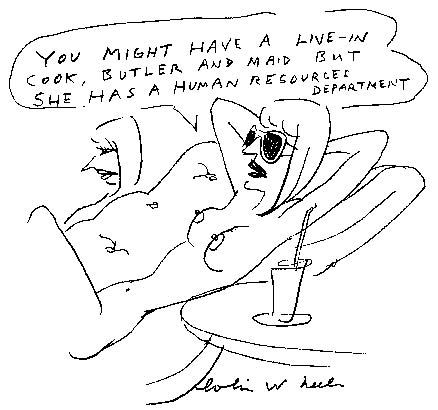I was lolling in a deckchair with a vanilla ice cream, watching the literary types in their interesting shoes pass to and fro along the cobbled path, when, 30 yards away, across the grassy courtyard, Martin Amis appeared in a doorway and lit up. I recognised the face instantly.
I watched him carefully. He must have been gasping. How many seconds, roughly, do ordinary smokers inhale for at each visit? One second? Two? With Martin Amis I counted up to five. He sucked the guts right out of his fag in about four goes. The last time I saw anyone attacking a cigarette with as much boggle-eyed addiction was on a long-stay ward in a psychiatric hospital in the mid-Eighties. Martin Amis paced up and down a bit, head down, deep in thought. Then he looked up, as though suddenly arriving at his senses, and took in the courtyard lawn, the knots of festival-goers in deckchairs, the food stalls, the bookshop, and the Great Hall, inside which he would shortly be interviewed in public by Philip Hensher.
I’d stopped by at the literary festival for a look at the secondhand bookstall. I didn’t intend lingering, for in my experience there is nothing remotely festive about literary festivals. Literary funerals they ought to call them. If William Shakespeare turned up at one, he’d probably get chucked out for being too human. But today struck me as different. It was the first day and there was hugging and kissing going on, and some of the delight appeared genuine. Hot and bothered arrivals towing suitcases betrayed their frustration at the heat and a delayed train. In the bar, some of the customers, I noticed, were getting stuck in.
In a spirit of reconciliation between myself and literary festivals, I refreshed my glass and bought a ticket for the Martin Amis interview.
In a packed Great Hall, the steward said I wasn’t really supposed to bring pints of lager into the events but, if I promised to keep mine below eye-level, she’d turn a blind eye. On the dot of eight, Philip Hensher and Martin Amis shambled in to ragged applause and sat. Philip asked Martin about his latest novel, The Pregnant Widow, whereupon Martin spent 20 minutes reflecting on the nazification of Germany and the Holocaust. No matter which way he looked at it, he said, he found it totally inexplicable. There was nothing to compare with it. He attempted a comparison with the ten million peasants starved to death by Stalin, and offered some grisly and heart-rending anecdotes about that particular awfulness. But no, he concluded, at the end of the day the mobilisation and degradation of the Germans by the Nazi regime were somehow of a different order.
His Mum had died just a fortnight ago, I heard afterwards, so perhaps this subject reflected the bleakness he felt inside. And if you can’t talk about the horrors of the Holocaust and Stalin’s Terror at a literary festival, where can you? That fruity, intelligent, masculine voice held us from start to finish. I have rarely heard anybody speak as articulately. He sipped from a glass of white wine and appeared completely relaxed, though he must have been going out of his mind for a fag long before the hour was up. I was careful to keep my pint glass below eye-level.
Afterwards, in a blue tent, Martin Amis sat signing copies of his new novel. I went to the bar. When I came out again, he was still there, seated next to a pillar of pristine hardbacks, but there was nobody wanting one signed.
Here was my chance.
Grabbing a copy to use as my credentials for an introduction, I presented it to him and pleaded, ‘Give us a fag, Mart.’ ‘I’ve only got roll-ups,’ he said. I mimed joy and relief. With a wry, almost pained smile he took his pouch of Golden Virginia out of his jacket pocket and put it in my hand kindly. Inside the pouch there were half a dozen cigarettes — flattened and bent and mixed up with the tobacco — that he’d made earlier. He uses slim filters. I ignored the ready-rolled ones and made one of my own. As soon as I was ready, he smartly proffered his black disposable lighter. A gentleman. There was none of this getting revenge on a tiresome mendicant by making him plead for a flame.
I returned his pouch and he rolled one for himself, sparked up and inhaled deeply. A woman came over, and, ignoring me, almost shoving me out of the way, started gushing all over him. I stayed on to smoke and pretended to listen to the woman. Martin Amis listened to her politely, occasionally making affable noises. And I thought how good is this, to be standing here, in a blue tent, sharing drugs with Martin Amis, and the weekend only just starting.






Comments